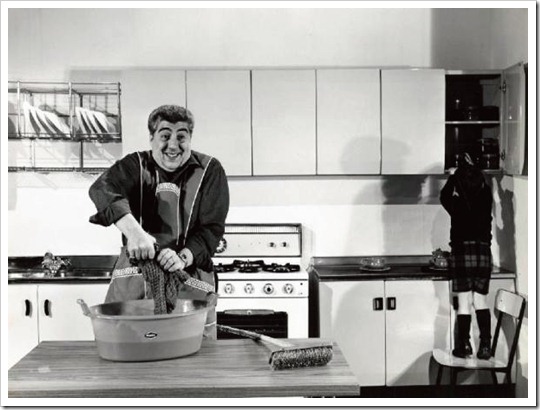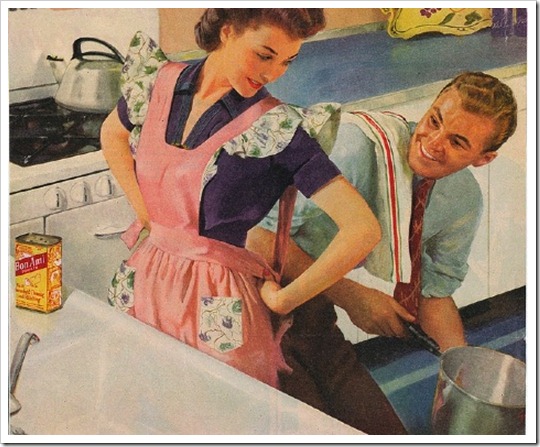Helpful Labels – The Kitchen Posted by Geoff on Nov 13, 2014 in Uncategorized
Almost exactly five years ago we began a series of blogs aimed at reinforcing Italian vocabulary through the use of contextual labels. We began the series with this blog: La Cucina (The Kitchen)
Today I’d like to suggest a more advanced version of contextual labelling that involves short phrases. But firstly let me just reiterate the concept behind this technique by quoting from the original post:
“Learning from a book, or in a class isn’t really the best way of developing your vocabulary for the simple reason that it is too abstract, i.e. too unconnected with the real world. Students often notice that they learn more Italian when spending a week in Italy than they would in a month of studying in their own country. Obviously, in Italy there would be far more opportunity to hear and absorb the language on a daily basis, but the important thing that really makes the difference is ‘context’. By context, I mean that your learning is taking place in the real world, for example: when you go through a door in a shop, or post office etc. very often you will see a little sign saying ‘spingere’ on the side that you have to push, and ‘tirare’ on the side that you must pull. In this way the verbs spingere (push) and tirare (pull) gradually become embedded in you memory without you even realizing it.”
Let’s take another look at la cucina with a list of contextual phrases for you to print out or copy, and place strategically in your home environment.
 |
| Comedian Gino Bramieri impersonates a housewife in the kitchen |
vado in cucina = I’m going into the kitchen (place this outside the entrance to your kitchen if possible)
esco dalla cucina = I’m leaving the kitchen (place this inside the entrance to your kitchen if possible)
vado a cucinare = I’m going to cook (as above)
accendo/spengo la luce = I’m turning the light on/off (near light switch)
accendo il fornello = I’m lighting the ring/hob (on or near cooker)
spengo il fornello = I’m turning off the ring/hob
accendo il forno = I’m lighting the oven
spengo il forno = I’m turning off the oven
prendo una pentola = I’m getting a saucepan (e.g. on cupboard door)
metto via la pentola = I’m putting the saucepan away
 |
| Una vera casalinga degli anni Cinquanta! |
prendo una tazza = I’m getting a cup
metto via la tazza = I’m putting the cup away
prendo un piatto = I’m getting a plate
metto via il piatto = I’m putting the plate away
apro l’armadietto = I’m opening the cupboard
chiudo l’armadietto = I’m closing the cupboard
apro il frigo = I’m opening the fridge (on fridge)
chiudo il frigo = I’m closing the fridge
apro il congelatore = I’m opening the freezer (on freezer)
chiudo il congelatore = I’m closing the freezer
apparecchio la tavola = I’m setting/laying the table (see this blog: Tavolo or Tavola)
sparecchio la tavola = I’m clearing the table
lavo i piatti = I’m washing the dishes/pots/doing the washing up etc. (near sink)
asciugo i piatti = I’m drying the dishes
metto i piatti nella lavastoviglie = I’m putting the dishes in the dish washer
metto su il bucato = I’m putting the washing machine on (if you have one in your kitchen)
apro il rubinetto = I’m opening the tap (near sink)
chiudo il rubinetto = I’m closing the tap
Obviously you can add your own original labels to this list as you see fit. If you want to check with us that your labels are correct please leave a comment.

Build vocabulary, practice pronunciation, and more with Transparent Language Online. Available anytime, anywhere, on any device.




Comments:
TC:
I like this post very much. How would you express that you are cleaning/tidying up? I believe that in italian, it is expressed as putting things in order, or in their place? Also, what is the difference in saying that you are baking cookies vs. cooking (as in frying meat on the stove) or roasting something? All different verbs? To bake, to cook, to roast? Would you use the verb fare to say you are “making cookies”? Grazie!
Serena:
@TC Salve TC! Interesting questions. I’m going to reply to them next week with a blog about cooking vocabulary. Va bene?
Saluti da Serena
Marta:
Thanks so much for providing phrases and context. I think this really helps with getting used to which preposition goes with what. That is one the hardest things for me to learn. I think that learning these phrases is a much better way!
Marta
PS: Looking forward to the cooking one.
Serena:
@Marta Salve Marta, sono contenta che questi articoli ti siano utili.
Saluti da Serena